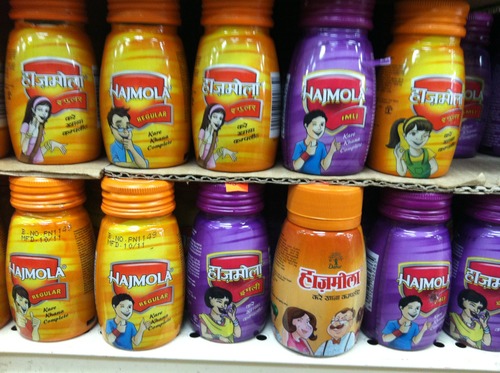Shri Pankaj Goel Vs. Dabur India Ltd.
Shri Pankaj Goel Vs. Dabur India Ltd.
2008 (38) PTC 49 (Del) (DB)
Respondent filed a suit against the Appellant seeking a permanent injunction for restraining the Appellant towards using the mark ‘RASMOLA’ for digestive tablets as the mark ‘RASMOLA’ is similar to ‘HAJMOLA’. The Respondent obtained an ex parte injunction in it’s favour. Th Appellant filed the present appeal.
Appellant’s Contentions:
• Appellant has been using the mark RASMOLA for its product namely digestive tablets since 1989.
• Appellant’s mark had been registered.
• Suffix MOLA is not an invented word of the Respondent.
• MOLA is common to the trade as more than 25 trademarks are registered with the suffix MOLA.
• Variants of MOLA for digestive tablets are commonly available in the market.
• Respondent had obtained the ex-parte injunction by concealing and suppressing facts. Respondent had concealed the fact of filing of three earlier suits by it, against the marks SIDHMOLA, SATMOLA AND CHATMOLA. In all the aforesaid three suits, the Respondent had got no relief and it subsequently compromised the suits by permitting those three parties to use the marks SIDHMOLA, SATMOLA AND CHATMOLA.
• Respondent suit is hit by law of acquiescence and delay as the Respondent had knowledge of adoption of user of the mark RASMOLA for a long time. Appellant relied upon back to back advertisement of Appellant and Respondent’s products on national TV channels.
Respondent’s Contentions:
• Respondent’s registered trade mark HAJMOLA is a coined and invented word. While part of the word HAJ is inspired by hajma which means digestion, the other part namely MOLA means nothing. HAJMOLA is very distinctive and was entitled to highest protection in the said mark.
• Respondent was the prior user of the registered trade mark HAJMOLA since 1972.
• Appellant’s adoption of a similar mark was dishonest and no amount of user could cure it.
• Appellant’s registration of its trademark RASMOLA was of no defence as the registration was for the whole of label/device mark and not the word RASMOLA. In view of Section 17of the Trade Marks Act, 1999 no exclusivity or statutory right can be claimed by the Appellant in the word/mark on account of device mark registration.
• In view of Section 27(2) of the Trade Mark Act, 1999 registration does not, in any event, affect a passing off action.
• No document on record to show any sale of RASMOLA product in the year 1989.
• There are 20,000 ads in a month of Respondent itself on 129 TV channels and therefore, it was not possible for thr Respondent, to monitor TV commercials on all the TV channels. Thus, no knowledge can be attributed to the Respondent of TV commercial of the Appellant.
• SATMOLA was allowed by way of a settlement The reason for settlement was acquiescence, as though the Respondent/plaintiff had issued a legal notice to SSG Pharma in 1984 but inadvertently it never followed it up till 2006 when the said suit was filed. In any event, Section 28(3) of the Trade Marks Act, 1999 permits more than one proprietor of deceptively similar trademarks.
• Appellant had already been injuncted from manufacturing and selling products under the mark RASMOLA in the impugned packaging by District Judge, Muzaffarpur in Suit SSG Pharma, user of the mark SATMOLA. Since the Appellant was guilty of concealment and misrepresentation, it was not entitled to seek any equitable relief from this Court.
Held:
• Registration of RASMOLA by the Appellant offers no complete defence to it.
• In the present case, marks are not only similar but the products are identical and are purchased by the same class of customers through the same trade channel. The trinity of factors makes for a case for confusion and consequently for passing off. Passing off is a recurring cause of action and delay being a defence in equity would not be available if the Defendant’s conduct is fraudulent.
• Appellant’s subsequent adoption of a similar mark seems prima facie dishonest and no amount of user can cure it.
• As far as the argument that the word MOLA is common to the trade, Appellant has not been able to prove that the said ‘infringers’ had significant business turnover or they posed a threat. In fact, the Respondent is not expected to sue all small type infringers who may not be affecting Respondent.
• A private settlement executed by the Respondent cannot offer a licence to the world at large to infringe its mark HAJMOLA. Reliance was placed on, Castrol Limited v. A.K. Mehta; 1997 PTC (17) 408 DB wherein it was held that a concession given in one case does not mean that other parties are entitled to use the same.
• Keeping in view the Respondent’s advertisement budget and it’s scale it would be difficult to presume, by a few isolated incidents that the Respondent was aware of the Appellant’s product since 2005. Reliance was placed on, Automatic Electric Ltd. v. R.K. Dhawan; 1999 PTC (19) 81 wherein it was held that publication of Defendant’s advertisement in the same magazine by itself is not sufficient to infer plaintiff’s awareness of use of a similar mark.
The appeal was dismissed.


One Comment